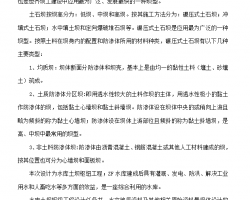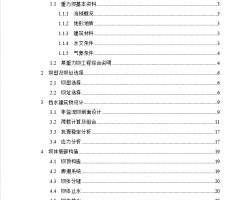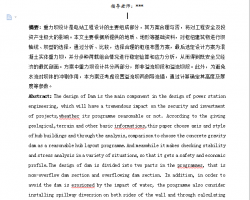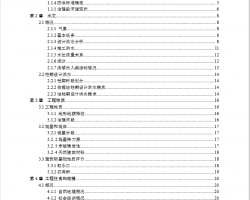摘 要:近年来,各地小型农村水利改革蓬勃发展,创造了许多新的经验,取得了一定成效。如何推动改革深入健康进行,使农村水利建设与管理的政策逐步完善,走上正规化、法制化轨道,需要对改革思路和深层次政策问题进行认真研究。作者在这里谈几点看法,供参考。
Pick to: in recent years, around the small rural water conservancy reform of booming development, created many new experiences, and achieved some results. How to promote the further health reform, the policy gradually improve rural water conservancy construction and management, normalization and legalization orbit, in-depth reform train of thought and policy issues have to be careful study. The author talk about some views, here for your reference.
关键词:小型农村水利;改革;思路
Key words: small rural water conservancy; Reform; Train of thought
一、小型农村水利的特点与性质
A, the characteristics and nature of small rural water conservancy
(一)小型农村水利的特点
(a) the characteristics of small rural water conservancy
通常把灌溉面积1万亩、除涝面积3万亩、渠道流量1立方米每秒以下的工程界定为小型农村水利工程。小型农村水利工程种类和功能很多,大体可归纳为以下几类:小水库、塘坝、水池等蓄水设施,小型拦河闸坝、引水闸、截潜流等引水设施,渠道、管道、闸门等输水配水设施,渡槽、隧洞、倒虹吸、桥、涵等交叉建筑物,泵站、机井等提水设施,灌水沟、畦、喷灌、滴灌、闸管、“小白龙”等田间灌水设施,保护村镇、农田的小型圩堤、河道堤防等防洪设施,排水闸、排涝泵站、排水沟、地下暗管等排涝降渍设施,乡村自来水厂、水窖等生活供水设施。据不完全统计,全国约有2000万处小型农村水利工程。
Usually the irrigation area of 10000 mu, and waterlogged area of 30000 mu, channel flow under 1 cubic meters per second as small rural water conservancy project engineering. Small species of rural water conservancy projects and many functions, can be roughly divided into the following categories: small reservoir and shuitangba, pools, such as water storage facilities, small DAMS and sluice gate structure, water diversion sluice, cut the undercurrent water diversion facilities, such as channels, pipe, valve and other water water distribution facilities, aqueduct, tunnel, inverted siphon, bridge, culvert, such as cross structures, pump stations, water facilities such as the shaft, irrigation ditch, strip, sprinkler irrigation, drip irrigation, brake pipe, such as "little white dragon" field irrigation facilities, small towns, farmland protection WeiDi dikes, river flood control facilities, such as outlet, drainage pumping stations, drainage and underground drainage tubes drainage JiangZi facilities, rural waterworks, water cellar life water supply facilities, etc. According to incomplete statistics, there are about 20 million small rural water conservancy projects in the country.
小型农村水利的特点:一是地位作用重要,需要高度重视。二是群众性强,需要广大农民参与。三是公益性较强,需要政府扶持。四是具有垄断性,需要政府加强宏观管理。农村水利设施多地处农田荒野,无人值守;风吹日晒雨淋,易老化损坏;土方工程多,维护工作量大。除生活供水工程外,多数工程季节性使用。农村水利的建设与管理需要在政府的规划与计划指导下有序进行。
The characteristics of small rural water conservancy: one is the important position, needs to pay close attention to. Second, the mass is strong, need to farmers to participate in. Three is the public welfare is stronger, needs government support. Four is a monopoly, the need to strengthen government macro management. Rural water conservancy facilities located in farmland wilderness, unattended; The storm or aging damage; Earthworks, maintenance workload. In addition to the life water supply project, most engineering seasonal use. Rural water conservancy construction and management need to be under the guidance of the government's plans for the planning and orderly.
(二)农村水利的性质
(2) the nature of the rural water conservancy
农村水利是农民抗御自然灾害,改善农业生产、农民生活、农村生态环境条件的基础设施,是促进农业增产、农民增收的物质保障条件。除农户自用的微型工程外,农村水利与农村道路、农村供电等同属农村公共工程,是农业和农村社会化服务体系的组成部分,具有较强的基础性、公益性。
Rural water conservancy is a farmer resist natural disasters, improve agricultural production and farmers' life and rural ecological environment condition of infrastructure, is to promote agricultural production, increasing farmers' income so as to ensure the material conditions. Except for farmers use micro engineering, rural water conservancy and rural roads, rural electricity supply belong to the rural public works and is part of the agriculture and the rural social service system, strong basic, public welfare.
农民是农村水利事业的主体。尊重农民意愿,依靠农民的力量,合作办水利,是发展农村水利事业的基本原则。农村水利的宗旨是服务。以兴利为主的工程,既要适应市场经济要求,有偿服务,核算成本,降低费用,促使工程良性运行,又要坚持不以营利为目的的宗旨。有关法律和政策对此有明确规定。
Farmers are the main body of rural water resources projects. Respecting farmers' will, rely on the power of the farmers, do water conservancy cooperation, is the basic principle of rural water conservancy development. Rural water conservancy purpose is service. Give priority to in order to create project, both to adapt to market economy requirements, paid services, cost accounting, reduce costs, prompted engineering benign operation, and to adhere to the principle of not for-profit. Relevant laws and policies have specific provision.
二、明晰所有权,组建用水合作组织
Second, the clear ownership, forming water cooperation organization
“谁受益,谁负担,谁投资,谁所有”是农村水利体制改革要遵守的重要原则之一。具体来说,不同类型工程,应实行不同管理体制。
"Who benefits, who pays and who invest, who all" rural water conservancy reform is one of the important principles to follow. Specifically, the different types of projects, different management system should be carried out.
(一)农户自用的微型工程,实行“自建、自有、自管、自用”体制
(a) farmers own miniature project, implement the "build, own, since the tube, for private use" system
农户自用为主的微型蓄引提工程,政府可酌情在经费上给予补助。这类工程作为农民的家庭私有财产,发给产权证,受法律保护。
Farmers own miniature led to storage project, the government can discretionary spending on subsidies. This kind of project as a farmer's family, private property property right card, protected by law.
农户自有工程自己用不完的水,允许在农户之间,按平等协商、互利互惠、有偿服务的原则,调剂余缺,充分发挥工程和水资源最佳效益。
Farmers owned engineering to burn our own water, allow between farmers, according to the equal consultation, mutual benefit and reciprocity, the principle of paid services, dispensing, we give full play to the project and the best benefit of water resources.
(二)较多农户受益的小型公共水利工程,推行多种形式的农民用水合作组织管理体制
(2) more small farmers benefit from the public water conservancy project, the implementation of various forms of farmer cooperation organization management system with water
受益农户较多,特别是跨村或跨乡的小型公共工程,应当按水系、渠系范围,组建用水户协会等多种形式的农村用水合作组织。这种体制有以下特点:首先,它不按乡、村行政区划组建,更符合水利建设和管理的特殊要求,可以避开乡、村借水费名义搭车收费或截留挪用等问题。第二,明确用水户是建设主体、投入主体、所有者主体、受益主体,形成了以用水合作组织为纽带的利益共同体。第三,机制灵活。合作办水利,就是要有钱的出钱,有力的出力,有设备的出设备,可以以物换工,以资换工,以工换工,以工换水,每个成员的权利、责任和应尽义务都严格按章程办事。第四,合作组织要按法律规定注册登记,成为有法人地位的服务实体,受法律保护,能独立承担民事责任。第五,合作组织有章程,民主选举负责人,在内部采用民主协商方法决定成员出工、出资分摊以及水费计收等大事。
Benefit farmers more, especially across different village or township small public works, shall be according to the water system, scope of canal system, formation water user association, and other forms of rural cooperation organization with water. This system has the following characteristics: first, it is not in accordance with the township, village administrative divisions to form, more in line with the special requirements of water conservancy construction and management, can avoid the township and village borrow or interception misappropriate the water in the name of a lift. Second, clear water users are the subjects of construction, investment main body, the owner and the benefit main body, formed by water cooperation organization as a link the interests of the community. Third, flexible mechanism. Cooperation office of water, is to the rich pay, powerful output, equipment of the equipment, to exchange Labour, to exchange Labour, to exchange Labour, in order to change water, each member's rights, responsibilities, and its obligations in accordance with the articles of association. Fourth, cooperation organization registered according to law, and become a service entities with legal person status, protected by law, and can independently bear civil liability. Fifth, cooperation organization have articles of association, head of democratic election, internally democratic consultation methods members decided to work, investment allocation and water rate collecting things.
(三)经营性的小型农村供水工程按“股份合作制”企业体制运作
(3) the management of small rural water supply project in accordance with the "share cooperation enterprise system operation
以向乡村企业、果园、种植场、养殖场供水为主,兼有村民生活供水任务的农村供水工程,应参照“股份合作制”企业办法组建企业法人实体,实行企业内劳动者平等持股、合作经营,劳动者与所有者相结合,股本和劳动共同分红的办法。在这种管理体制下,产权清晰,所有者的权、责、利十分明确,有较强的内在经营活力。为了解决建设资金不足的问题,可以吸收有钱的“大户”投资入股,并给予合理投资回报。但要防止出现“水霸”垄断乡、村公共供水设施或利用公共水资源牟取暴利的情况。从扶持农村供水基础设施建设出发,地方政府也可 酌情对工程建设给予补助,这部分资金形成的股权应为政府所有,政府通过持股参与监督企业经营管理。
To the rural enterprise, orchards, plantation, farming water supply is given priority to, with the villagers living water task of rural water supply project, should refer to "share cooperation enterprise to form a legal entity, ensures equal shareholding enterprise, cooperative management, owners and employees combine, equity and work together to share out bonus. Under this management system, clear property rights, the owner of the rights and responsibilities, clear, strong internal business vitality. In order to solve the problem of insufficient construction funds, can absorb the rich "investors" investment, and a reasonable return on investment. But to prevent "water heater" monopoly township, village public water facilities, or using the public water resources for profiteering. From supporting the rural infrastructure construction of water supply, local governments also can take into consideration the subsidies in engineering construction, this part of the capital formation of equity should be the government, the government through shareholding enterprise supervision and management.
三、形式灵活多样加强经营管理
Three, flexible and varied forms to strengthen the operation and management
明确了农村水利公共设施归用水户集体所有,作为“业主”的用水合作组织还必须采用灵活多样的形式,加强经营管理,落实工程维护管理和服务责任,千方百计发挥工程效益。
Has been clear about the rural water conservancy over the water user collective public facilities, as the "owner" of the water cooperation organization also must adopt flexible and varied forms, strengthen management, to carry out the engineering maintenance and management and service responsibility, one thousand party hundreds of engineering benefits into full play.
(一)用水合作组织自己直接经营管理
(a) water cooperation organization oneself management directly
这种方式适用各类农村水利工程。应当成为当前和今后农村水利管理制度改革的主要方式加以提倡。目前全国近80%的工程仍实行所谓的乡村“集体”管理,应当逐步规范为用水合作组织自主经营管理。
This approach applies to all kinds of rural water conservancy projects. Should be the current and future rural water management system reform, the main way to advocate. China now nearly 80% of engineering implement so-called country "collective" management, shall gradually specification for water cooperation organization independent operation and management.
(二)用水合作组织聘用“能人”经营管理
(2) of the water cooperation organization to hire "wise men" operation and management
用水合作组织内部找不到合适人选时,可以聘用外部的“能人”具体负责经营管理。被聘者为用水合作组织“打工”,领取报酬。用水合作组织对受聘者监督,促使其真正对工程的日常经营管理负起责任,搞好服务。
Cannot find a suitable candidate, water cooperation organization can hire outside of the "wise men" to be responsible for operation and management. By hiring "working" for a water cooperation organization, receive the payment. Water cooperation organization to supervise the organizations, to promote its real daily operation and management for the engineering responsibility, do well the service.
(三)承包
(3) contracts
承包不改变工程所有权属。它通过合同契约,由工程的所有者把管理权委托给承包者,同时对双方权利、责任、义务给予明确,承包者比合作组织聘用的管理负责人有更大的自主权。承包者可以是合作组织内部成员,也可以是社会上的人,可以一个人,也可以是几个人组成的小组。
Don't change project contracting all the ownership. It by contract, by the project owner delegates authority to the contractor, give clear rights, responsibilities and obligations for both sides at the same time, the contractor has more than cooperation organization hire management, head of greater autonomy. Contractors can be cooperation organization member, also can be a social person, can a person, can also be a panel composed of several people.
承包方法简便易行,较好地解决了工程维护管理差,管理责任不落实的问题,易被农民接受,已有多年实践经验,适用于各种类型的农村水利公共设施。目前全国约有10%的工程采用这种形式,应当作为农村水利经营管理机制改革的主要方式之一加以提倡。
Contracting method is simple, easy to follow and solve the engineering maintenance and management, management responsibility not to carry out the problem, easy to be accepted by the farmers, for many years practical experience, is suitable for various kinds of rural water conservancy infrastructure. About 10% of the whole country at present the project in this form, shall be used as the rural water conservancy management mechanism reform of one of the main ways to promote.
(四)租赁
(4) the lease
严格地说,它与承包经营管理属于同一类型,因为工程所有权没有改变,只是所有权与经营管理权分离得更进一步,租赁者在经营管理上有更多的自主权。租赁者可以从直接或间接的经营利润中获取报酬,同时也承担更多的经济责任和风险。因此“租赁”主要适用于经营性较强,可以自主经营、自负盈亏的农村水利工程。
Strictly speaking, it and contracting management belong to the same type, because the ownership of the project has not changed, only further separation of ownership and management right, the renter have more autonomy in management. The renter can, for a price from the direct or indirect business profits, but also more economic responsibility and risk. So "lease" is mainly suitable for operational stronger, can operate independently, self-financing, rural water conservancy projects.
(五)“拍卖”经营管理权
(5) "auction" management control
“拍卖”农村水利设施经营管理权存在三种风险:一是购买者不能取得预想利润,甚至背上沉重的债务负担;二是购买者掠夺式地开发水资源(机井)或工程设施,工程损坏报废后,还得让广大群众收拾“烂摊子”,重新出资投劳;三是购买者改变工程用途,让防洪抗旱服从个人养殖,受害的也是广大用水户。这种方法主要适用于经营性较强的工程设施。在全国2000万处工程中约有近3%采用“拍卖”方式。
"Auction" rural water conservancy facilities management right there are three types of risks: one is the buyers can not achieve expected profits, even back heavy debt burden; 2 it is buyer's predatory development of water resources (shaft) or engineering facilities, engineering after damage to scrap, still have to let the masses gathered "mess", contributive work-relief funds again; Three is the buyer change the project purpose, let the flood control and drought obey personal cultivation, the victims are large water users. This method is mainly used in the business strong engineering facilities. About nearly 3% in the national 20 million project "auction" way.
四、履行政府职责,加强宏观调控
Fourth, the government duties, strengthen the macroeconomic regulation and control
推动农村水利事业健康、蓬勃发展,要抓好三个关键:一是发挥农民群众主体作用,解决体制不顺的问题;二是灵活运用市场机制,加强经营管理,解决运行机制不活的问题;三是加强政府引导扶持,做好服务监督,提供必要的公共服务和公共产品,为体制与机制改革创造有利的环境条件,三者缺一不可。第四,提供资金、材料设备等扶持,包括正常情况下的资金补助和发生特大自然灾害时的补助;第五,通过建立和完善基层技术推广服务体系,提供工程建设与管理中的技术指导、信息、培训、科普宣传等服务;第六,对农村水资源开发利用、农村水利经营管理等进行监督,防止政府补助经费、农民集资和收取的水费被截留挪用,防止无偿平调农民投工,防止垄断公共资源、侵害农民利益等违法情况发生。
Promote health and booming rural water resources projects, should pay special attention to the three key: one is to play a role of peasants subject, solve the problems of the system; Second, flexible use of market mechanism, strengthen management, solved the problem of living of the operating mechanism; Three is to strengthen government guide farmers, completes the service supervision, provide necessary public services and public products, create favorable environmental conditions for system and mechanism reform, the landscapes themselves. Fourth, to provide funds, materials, equipment and other support, including funding for normal conditions for subsidies and catastrophic natural disasters; Fifth, through establishing and perfecting technical extension service system at the grass-roots level, to provide technical guidance in the engineering construction and management, information, training, science popularization and other services; Sixth, water resources development and utilization in rural areas, rural water conservancy management supervision, prevent the government subsidies, farmers raise and collection of water interception misappropriate, prevent TouGong level farmers free of charge, to prevent the monopoly of public resources, farmers interests such as illegal case.
关于小型农村水利改革的名称问题。许多人把小型农村水利改革归结为“产权制度改革”,这是不准确的,它没有全面、准确地表达出农村水利改革丰富的内涵和关键所在,容易使人误解,似乎只要解决了产权问题,一切问题都迎刃而解,甚至“一卖了之”。产权制度改革是农村水利改革内容的一部分,但不是全部。在以服务为宗旨,非营利性质的前提下,过分强调“产权”,没有太多实质意义。所有权一定要明晰,所有者主体一定要到位,这是改革的切入点。因此,小型农村水利改革应当概括为建设与管理制度改革,也可以简称“管理制度改革”。
About the name of a small rural water conservancy reform. To many small rural water conservancy reform property right system reform ", this is not accurate, it does not fully and accurately express the rich connotation of the reform of rural water conservancy and key, easy to misleading, seem to be as long as can solve the problem of property rights, all problems are solved, and even "YiMaiLeZhi". Property right system reform is part of the rural water conservancy reform content, but not all of them. In terms of service for the purpose, under the premise of non-profit, too much emphasis on "property rights", don't have much substance. Property rights must be clear, the owner subject must be in place, this is the breakthrough point of the reform. So small rural water conservancy reform should be summed up as the construction and management system reform, can also be referred to as "management system reform".





